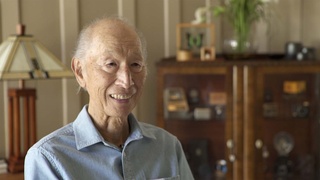Affect of the World War II (Japanese)
(Japanese) During the war, because, of course, I was considered an enemy alien, I had to stop working as a caminhão (truck) driver. My son was part of the Brazilian army, so he went into the battlefield in Italy. Anyway, the trucks were ordered to stop. They cannot take my caminhão away, so they broke off a part of the engine so that I would be unable to work. Since I was involved in the shipping industry, and because many Japanese people came in and out, it caused a lot of chaos. And since I thought being there would cause more trouble, I moved to my sitio (city) in Monte Albano. I tried farming there, even though I didn't know anything at all about [planting] milho (corn) (laughs).
Date:
Location: Brazil
Contributed by: Caminho da memória - 遥かなるみちのり. São Paulo, Brazil: Comissão de Elaboração da História dos 80 Anos de Imigração Japonesa no Brasil, 1998. VHS.





